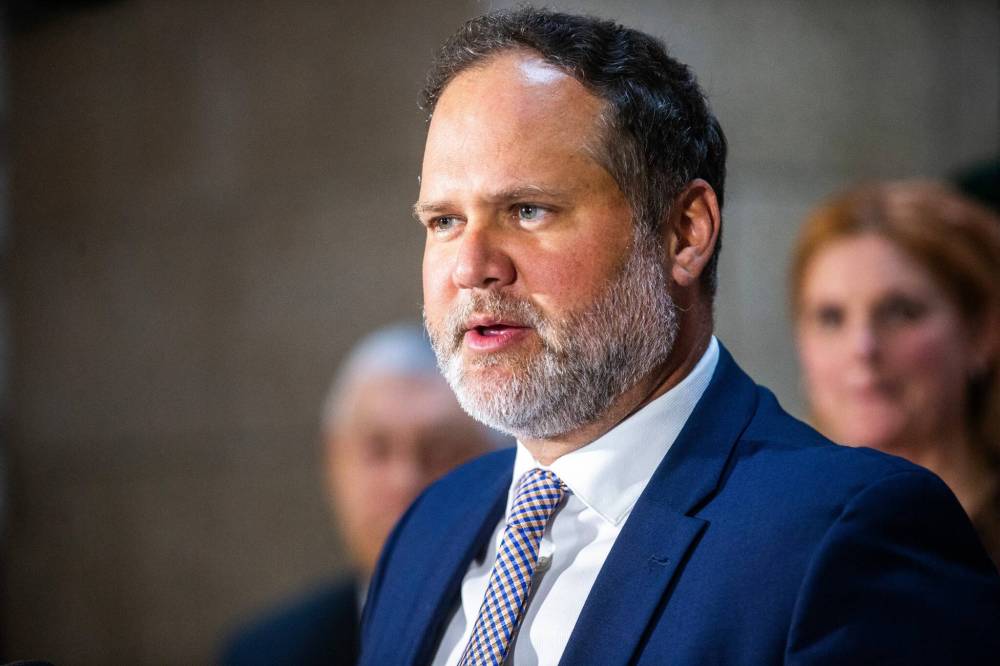Manitoba law deems deliberate pronoun misuse as discrimination
Advertisement
Read this article for free:
or
Already have an account? Log in here »
To continue reading, please subscribe:
Monthly Digital Subscription
$0 for the first 4 weeks*
- Enjoy unlimited reading on winnipegfreepress.com
- Read the E-Edition, our digital replica newspaper
- Access News Break, our award-winning app
- Play interactive puzzles
*No charge for 4 weeks then price increases to the regular rate of $19.00 plus GST every four weeks. Offer available to new and qualified returning subscribers only. Cancel any time.
Monthly Digital Subscription
$4.75/week*
- Enjoy unlimited reading on winnipegfreepress.com
- Read the E-Edition, our digital replica newspaper
- Access News Break, our award-winning app
- Play interactive puzzles
*Billed as $19 plus GST every four weeks. Cancel any time.
To continue reading, please subscribe:
Add Free Press access to your Brandon Sun subscription for only an additional
$1 for the first 4 weeks*
*Your next subscription payment will increase by $1.00 and you will be charged $16.99 plus GST for four weeks. After four weeks, your payment will increase to $23.99 plus GST every four weeks.
Read unlimited articles for free today:
or
Already have an account? Log in here »
Hey there, time traveller!
This article was published 18/03/2025 (278 days ago), so information in it may no longer be current.
New Manitoba legislation would deem the deliberate misuse of someone’s preferred pronouns as discrimination and increase human rights protections for the LGBTTQ+ community.
Bill 43 aims to insert “gender expression” among the list of protected characteristics under the Human Rights Code.
Justice Minister Matt Wiebe introduced the legislation, formally known as the Human Rights Code Amendment Act, on Tuesday.

Mikaela MacKenzie/Free Press Files
Justice Minister Matt Wiebe introduced Bill 43 on Tuesday. Formally known as the Human Rights Code Amendment Act, it aims to insert “gender expression” among the list of protected characteristics under the Human Rights Code.
“This would cover anything from behaviour or appearance, such as dress, hair, make-up, body language and voice,” Wiebe told reporters after question period.
The minister said it also encompasses pronouns to ensure children and adults can use their preferred descriptors freely and that they be respected.
It will align Manitoba, currently an outlier in Canada, with other jurisdictions and the federal Code, he said.
The proposal was tabled roughly 18 months after the PC Party of Manitoba made “parental rights” a key plank in its campaign in the 2023 election.
Obby Khan, who is one of two contestants in the Progressive Conservatives’ leadership race, was the face of the vague pledge. At the time, the party bought a billboard advertisement in downtown Winnipeg that displayed a photo of the father and the phrase, “Parents Know Best.”
The party promised to update laws to address bullying “and other behaviour changes.” It was launched amid a national conversation about preferred pronouns and their place in kindergarten-to-Grade 12 schools.
New Brunswick, Saskatchewan and Alberta have started regulating the use of preferred names and pronouns in school settings. Students under 16 are required to obtain parental permission to request changes in how they are formally addressed in classrooms in these provinces.
Wiebe called parental rights rhetoric “dog whistle language,” echoing concerns that have been raised by caucus colleagues and trans advocates.
“Manitoba’s really behind on this work on protecting our community,” said Charlie Eau, executive director of Trans Manitoba.
Trans and gender-nonconforming people face discrimination on a daily basis, be it as a result of their wardrobe, voice or otherwise, said Eau, who is non-binary and uses they/them pronouns.
Eau said community members can file human rights complaints related to these issues at present, but it’s a “very long, slow, tedious and often, ineffective process.”
Existing legislation recognizes gender identity and sexual orientation, among other protected characteristics.
“It makes a difference to have our safety established and entrenched in the law,” they said.
Last year, NDP MLA Logan Oxenham — who is the first openly transgender man elected to the legislature — introduced a bill to recognize March 31 as the Two-Spirit and Transgender Day of Visibility.
Khan did not attend a spring vote on the subject, citing a medical appointment.
However, he has since expressed support for such an occasion, saying members of minority groups deserve a day “that recognizes you and the importance you have.”
This month will mark the first time the event is formally celebrated by the Manitoba government, per the law that came into effect in June.
maggie.macintosh@freepress.mb.ca

Maggie Macintosh
Education reporter
Maggie Macintosh reports on education for the Free Press. Originally from Hamilton, Ont., she first reported for the Free Press in 2017. Read more about Maggie.
Funding for the Free Press education reporter comes from the Government of Canada through the Local Journalism Initiative.
Every piece of reporting Maggie produces is reviewed by an editing team before it is posted online or published in print — part of the Free Press‘s tradition, since 1872, of producing reliable independent journalism. Read more about Free Press’s history and mandate, and learn how our newsroom operates.
Our newsroom depends on a growing audience of readers to power our journalism. If you are not a paid reader, please consider becoming a subscriber.
Our newsroom depends on its audience of readers to power our journalism. Thank you for your support.
History
Updated on Wednesday, March 19, 2025 7:27 AM CDT: Corrects headline




